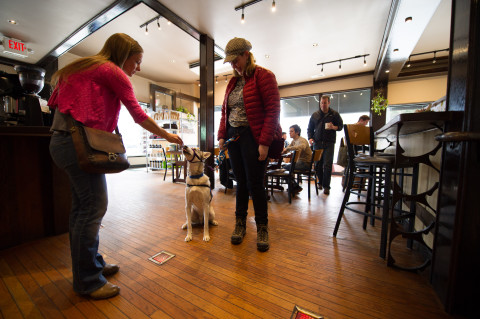When Kim Brophey was a kid, she was fascinated by Lassie, the collie who wowed TV audiences for decades with her intelligence and heroic rescues. These days Brophey, who owns The Dog Door, is bringing that kind of doggy derring-do to Asheville, training service animals to help people with disabilities and consulting with clients about dogs with behavioral challenges.
Her childhood awe hasn’t left her. “I am still mesmerized by my clients,” she reports, using terms like “rock star,” “amazing” and “small miracle” when she talks about the dogs she trains.
“There have always been a lot of people who could benefit from service dogs, but I think the public’s perception has been limited — that it was [only] dogs for the blind or the deaf,” she explains. Brophey has trained dogs to help with everything from seizures to post-traumatic stress disorder to Down syndrome and mobility issues. And these days, “More and more parents are realizing that they can get service dogs for their children, which is unbelievable; it’s amazing,” she says.
Sitting in the Green Sage Café, just a few doors down from The Dog Door, Brophey and three clients are talking about the work they’re doing together. Brophey is helping Tanya Lyon train Scepee — an 8-month-old, gray-and-white pit bull mix — for Lyon’s 8-year-old son, who’s on the autism spectrum. Just five months into the training, Scepee is surprisingly calm and relaxed for such a young dog, looking up from under the table with soulful eyes.
“She just wants to be there for him,” says Lyon, adding that her son “is calmer already just having her around.”
When fully trained, Scepee will be accompanying him to school, where he has a tendency to wander off, she says. After using the bathroom, for example, he may walk around the halls instead of returning to his classroom. To help with this, the dog will be trained “to know when it’s OK and when it’s not” to be walking around, says Lyon. “I don’t know how it comes together, but it does.”
Despite the complexity of the tasks these dogs are trained for, “I haven’t had to fail a dog yet,” notes Brophey. To help ensure a good outcome, she carefully assesses each animal before beginning training. “One of the things I’m really looking for in a dog — and some types of dogs have this more than others — is a strong work ethic. The dog has to want to do this. If they don’t, I will not force a square peg into a round hole,” she explains. Brophey looks for certain traits in a potential service dog: a “dog who is in his owner’s grill and looking at him all the time, like they’re asking all these questions; very cooperative without a lot of struggle; a dog that is highly social with their own person and already has a strong bond with that person.”

Camille Paxton found her dog, Sesoko, in Japan while doing postdoctoral research in cellular molecular biology. The husky mix had been abandoned and was running around the streets when Paxton took him in. She’s training him to help her with PTSD “so I can do things like go out by myself at night and not have panic attacks,” she says.
Samantha Dorf, the other Brophey client, is also training her dog to help with PTSD and social anxiety, as well as vertigo and asthma. Her dog, Dewy, is a big sweet lug, an 85-pound Labrador retriever-mastiff mix whose biggest problem appears to be fitting under restaurant tables. At Green Sage, though, he seems happy to lay his big head down and take a load off while everybody kindly overlooks the fact that his tail is sticking out. “He’s going to be around helping me with everything, because I’ve been pretty stuck in life,” says Dorf. “With my social anxiety I get scared to do things by myself, but when he’s around I don’t get scared.”
All three animals are in the early stages of their yearlong training. “The public-access piece is the first piece we deal with,” says Brophey. Service dogs must meet Americans with Disabilities Act requirements for behavior, she explains. “I would say everything about service dog training depends on the definition of the vest. … When the vest is on, you are under service dog rules; when the vest is off, you can be a regular dog and do whatever you want. It’s a big deal when we introduce the vest. And at that point all the rules change.” Dogs learn that when they are wearing the vest they can’t say hi to strangers or other dogs, can’t smell a random piece of garbage on the ground, and have to lie down under a table when their person sits down, explains Brophey. “They have to be completely low-profile and non-interruptive, or the person loses the right to have the dog with them,” she says.
Brophey, who studied applied ethology (which deals with domestic or captured animals and their relationships with humans), says she’s “endlessly fascinated by the possibilities in relationship between people and dogs. And service dog training pushes the limit. I love that: It’s the Lassie thing.”
After 15 years in the business and a growing client list, Brophey says she’s still “innocently enraptured” both by what dogs can be taught to do and by how much their humans benefit. “It’s like ‘Really? They can learn to pick up an object by [pointing] a laser, and pick up the right one, and jump up on the person and hand it to them? And like it?’ That’s intrigued me since I was this big,” she says, hand held at kid height, “and it still does. … And the other piece that lights me up like a Christmas tree is to see the joy it brings these clients … when the dog starts to meet the need and the person’s confidence, happiness and quality of life improve,” she reveals. “That, to me, is an emotional paycheck.”





Before you comment
The comments section is here to provide a platform for civil dialogue on the issues we face together as a local community. Xpress is committed to offering this platform for all voices, but when the tone of the discussion gets nasty or strays off topic, we believe many people choose not to participate. Xpress editors are determined to moderate comments to ensure a constructive interchange is maintained. All comments judged not to be in keeping with the spirit of civil discourse will be removed and repeat violators will be banned. See here for our terms of service. Thank you for being part of this effort to promote respectful discussion.